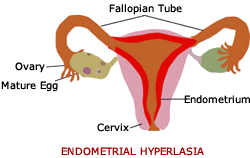|


WHAT IS ENDOMETRIAL HYPERPLASIA?
An overgrowth of the endometrium
(inner lining of the
uterus). This overgrowth can be localized or diffuse. This is not cancerous.
MOSTLY AFFECTS
Women over age 35.
SIGNS & SYMPTOMS
- Bleeding between normal menstrual periods.
- Heavy menstrual flow (saturating a sanitary pad once every
hour).
- Bleeding after menopause.
- Pain during menstruation.
CAUSES
Excessive estrogen,
a female hormone. This is caused internally or from the use of hormone-containing
medications. Endometrial hyperplasia rarely occurs in women who have a normal menstrual
cycle.
RISK INCREASES WITH
Use of oral contraceptives or estrogen replacement
therapy after menopause.
HOW TO PREVENT
No specific preventive measures.
DIAGNOSTIC MEASURES
- Typical symptoms.
- History and physical exam by a doctor.
- Laboratory tests, such as blood tests of hormone levels
and Pap smear.
- D & C (dilatation and
curettage) to obtain tissue for microscopic/histopathologic examination in order to rule
out malignancy
POSSIBLE COMPLICATIONS
- Perforation of the uterus and peritonitis
as a complication of surgery (rare).
- Excessive, uncontrollable bleeding.
PROBABLE OUTCOME
Often curable with D & C
(Dilatation and curettage) or hysterectomy. If a woman
chooses not to have surgery, hormone therapy usually controls symptoms.
TREATMENT
GENERAL MEASURES
- Try to reduce psychological stress that can complicate
your illness and delay your recovery. If you can't resolve the stress, ask for help from
family, friends or competent counselors.
- Use heat to relieve pain. Place a heating pad or hot-water
bottle on abdomen or back.
- Take frequent hot baths to relax muscles and relieve
discomfort. Sit in a tub of hot water for 10 to 15 minutes.
- Hysterectomy (surgery to remove the uterus) is sometimes
recommended.
MEDICATION
- If the D & C does not relieve symptoms and you don't
want a hysterectomy, your doctor will probably prescribe progesterone, another female hormone.
Avoid aspirin, it may increase
bleeding.
ACTIVITY
No restrictions unless you have surgery. Then resume your
activities gradually.
Ask your doctor about resuming sexual relations following
surgery or D & C. Don't hesitate to discuss this--it is an important part of your
life.
DIET
No special diet.
CONTACT YOUR DOCTOR IMMEDIATELY, IF
- You have symptoms suggestive of endometrial hyperplasia.
- The following symptoms occur during hormone treatment or
after surgery or D & C:
- Excessive bleeding (saturating more than 1 pad or tampon
every hour).
- Signs of infection, such as fever, general ill feeling,
headache, dizziness or muscle aches.
- New, unexplained symptoms develop. Hormones used in
treatment may produce side effects.
|
